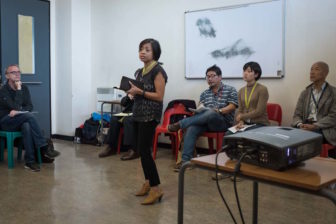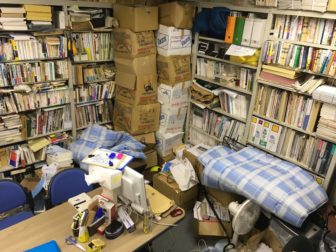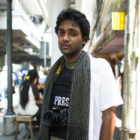This post originally appeared on the official website of the Global Investigative Journalism Conference 2017, for which IJEC organized and covered the academic track.

Columbia’s Sheila Coronel. Photo: Daylin Paul
Educators and veteran reporters presented different models for investigative journalism centers based at universities on Friday’s academic panel at #GIJC17 in Johannesburg this week. American University’s Charles Lewis and Columbia’s Sheila Coronel discussed different approaches at their US-based centers, while educators from Waseda University explained how their newly-founded center answers a need for investigative journalism in Japan.
Investigative centers that work together with or are based at universities provide students with the opportunity to work on long term investigations and gain practical experience. Some of their articles have been published in The New York Times and have been featured on programs such as Frontline.
“The centers are helpful to the students,” said Lewis, who founded the Investigative Reporting Workshop at American University. “By the time they come out, they have clippings in The Washington Post.”
University-based centers are starting to make up a sizable portion of investigative centers in the US.
The Toni Stabile Center for Investigative Journalism at Columbia University is a one-year master of science program. Coronel, the center’s founder, explained during her presentation that it functions as a professional learning center.
“We are a professional school, which means we are not part of a college.” Coronel said. “We have a lot of flexibility to innovate in the curriculum and in the extra-curricular activities.”
The center focuses on teaching rather than producing stories. Coronel has found that there is often a tension between production goals and teaching goals, while production should focus on learning the trade.
“Our mandate is to make sure that our students, within one year, are ready to be part of a challenging profession,” Coronel said. “And that they have the skills they need to have a head start.”
As the program is only one year long, the educators have decided to make a mandatory seven-week investigative techniques class. This has made a positive impact on the center’s students.
“Our students are far more excited in getting information and verifying now,” she said. “We find that especially important in these times, in a world of alternate facts, propaganda and disinformation.”
In their 15-week class, the Stabile Center gives students a crash course in investigative techniques. At the same time, they also work on their master project, which lasts eight months and for which each student gets an advisor.
The center provides students with funds for worldwide travel, public records requests and books to help them in their investigations.
For a student project on Chinese investments in Africa, students traveled to Singapore, Hong Kong and Guinea where they conducted interviews and continued their research.
“With the projects that have a promise of publication we fund for additional time — from one month up to one year — so the student can bring it to completion,” Coronel said. “Two or three of our student works have eventually become books.”
It is the center’s goal to have student names in the bylines. The center gauges its success by how well students do after they graduate.
“We want them to have the confidence and the ability to do ambitious investigations on their own,” Coronel said. “I currently have five students working at the International Consortium of Investigative Journalists. We have students at the New York Times, ProPublica, (Last Week Tonight with) John Oliver and the Washington Post.”
At Waseda University
For Hideaki Kimura, the managing editor for the Waseda Chronicle, universities can serve as an “incubator” for investigative journalism. The Chronicle is based at Waseda University and is meant to serve as a place for journalists to be nurtured and grow into independent investigative reporters.
“As an incubator, the center will have a hand in improving investigative journalism in Japan,” Kimura said. “We began as an investigative project in March last year.”
Based at Waseda University, the Chronicle started publishing articles in February 2017. It encompasses 25 members with diverse backgrounds.

Waseda Chronicle‘s newsroom. Credit: Presentation slides.
“The group includes 15 undergraduate students, a doctor, an engineer, a designer, a bar owner and also divers,” Kimura said. “Our newsroom is very small and a little smelly.”
The first series of articles, which is still ongoing, is called “Journalism for Sale” and shows how journalists were paid by medical company Dentsu to write pieces that advertise their products.
By looking at records and conducting interviews, the Chronicle’s team found that the reporters were paid 1.5 million Yen, which is about $13,300, per article.
When it comes to financing, the Japanese education system prevents the university from providing funds. The center has turned to memberships and crowdsourcing.
According to Kimure, the Chronicle fulfills a societal need in Japan.
“The establishment media in Japan has seized to play a watchdog function,” Kimura said. “At the same time, transparency in the government has decreased significantly.”
Tatsuro Hanada, the director of the Waseda University Institute for Journalism, explained the history behind the foundation of the Waseda Chronicle.
“Three years ago, the head of The Asahi Shimbun, the biggest newspaper in Japan, retracted a major investigative story under pressure from conservative forces,” Hanada said. “The head apologized at a news conference and the journalists that worked on the story were suspended.”
One of those journalists was Kimura. Together with another reporter, he left Asahi as they felt there was no room for investigative reporting there. They asked Hanada for a space away from the established media and state power, and Hanada provided them with a small room at the university.
Having the university as its base means that the reporters at Chronicle work in an academic environment.
“At the university they encounter academics and students,” Hanada said. “The Chronicle gives the students practical training and the students contribute greatly as manpower to the investigative work.”
The center is a part of Hanada’s intent to shift the focus of journalism education from getting a job in mainstream media to creating entrepreneurial reporters.
Three of the students trained at the center will start working at mainstream Japanese media outlets next week, bringing with them the mindset and skills fostered at the Waseda Chronicle.
Jelter Meers is a Belgian investigative reporter who works for the Investigative Journalism Education Consortium based at the University of Illinois. He helped coordinate the academic track and has worked on topics ranging from the agrichemical business to human trafficking.
 Daylin Paul is an independent photographer, visual journalist and photojournalism educator based in Johannesburg. He is the 2017 winner of the prestigious Ernest Cole Award for Photography for his ongoing documentary Broken Land and the 2017 Hostwriter Pitch Prize for Collaborative Journalism. His work has appeared in The New York Times, The Guardian, Foreign Policy, Financial Times and Huffington Post.
Daylin Paul is an independent photographer, visual journalist and photojournalism educator based in Johannesburg. He is the 2017 winner of the prestigious Ernest Cole Award for Photography for his ongoing documentary Broken Land and the 2017 Hostwriter Pitch Prize for Collaborative Journalism. His work has appeared in The New York Times, The Guardian, Foreign Policy, Financial Times and Huffington Post.